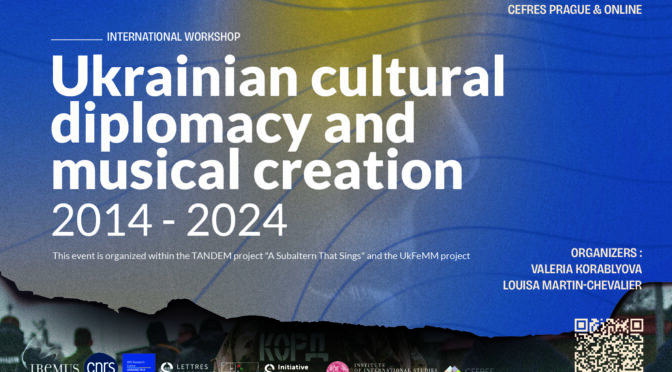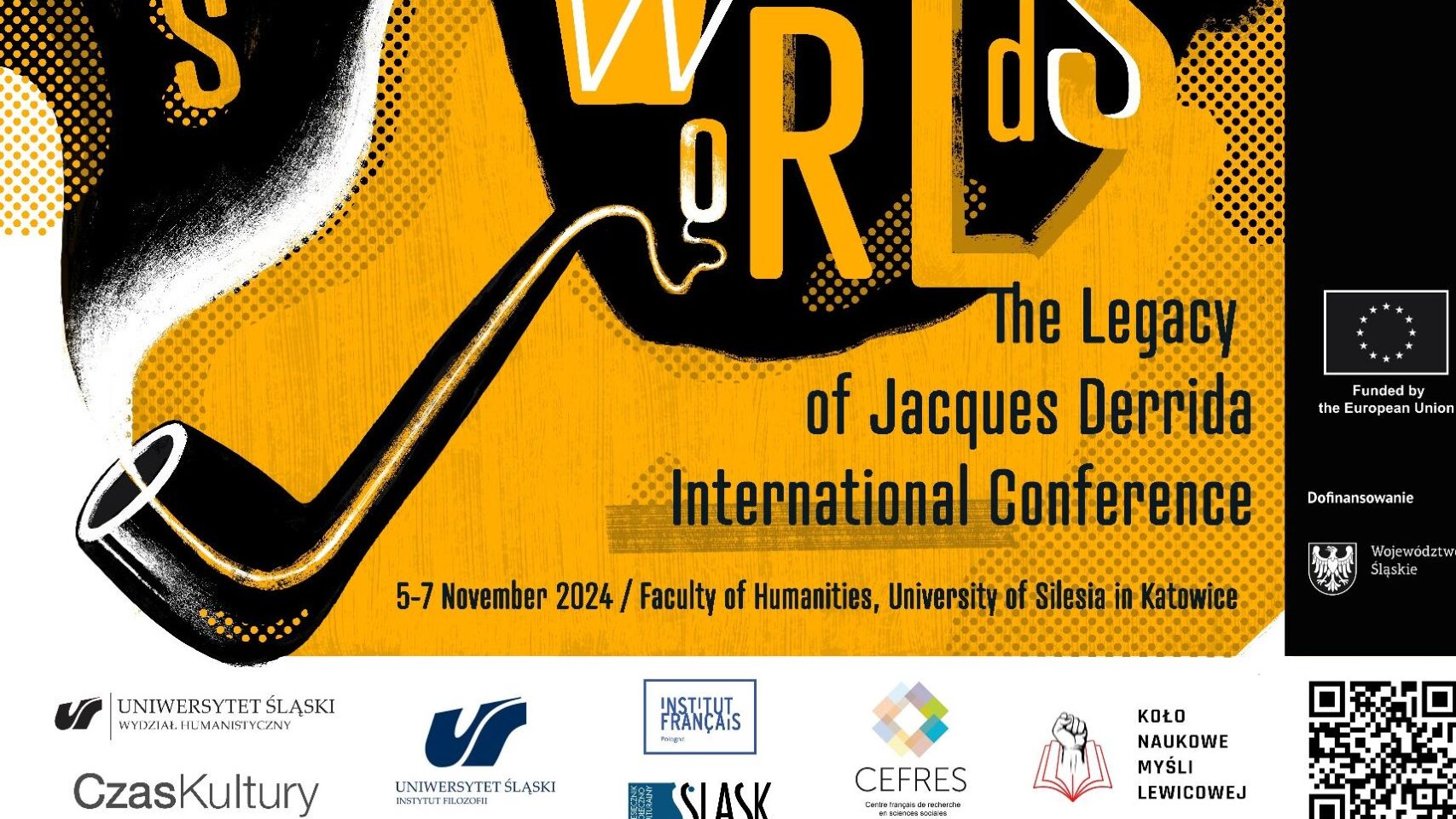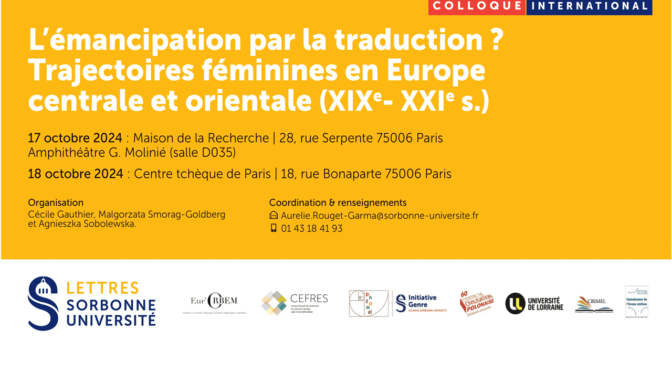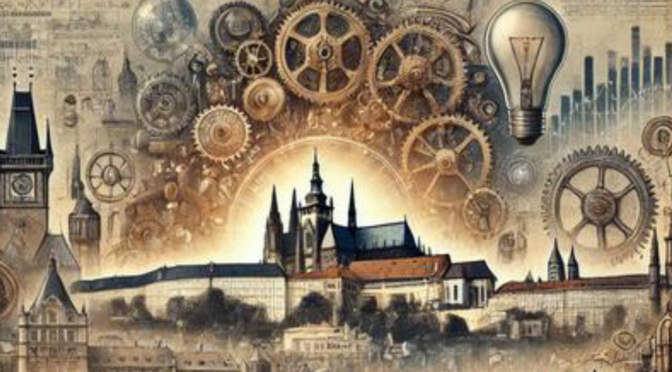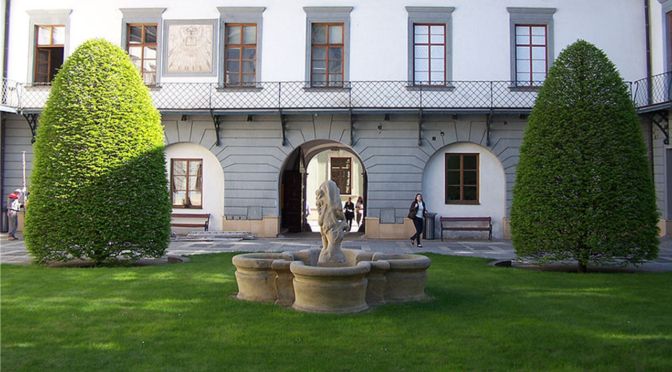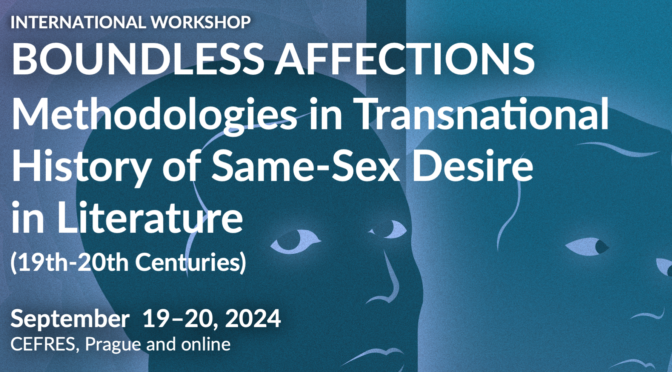After Words / After Worlds, The Legacy of Jacques Derrida, International Conference
International Conference organized by the University of Silesia in partnership with CEFRES and the French Institute in Poland to reflect on Derrida’s Legacy on the occasion of the 20th anniversary of Derrida’s passing
Date: from 5 to 7 November 2024
Place: Uniwersytecka 4, 40-007 Katowice
Language: English
Organizers:
Partners: CEFRES, French Institute in Poland
Please find thereafter the Thesis of the Conference
Presentation of the conference:
The main axis of the proposed discussion concerns contemporary readings of deconstruction, especially regarding its political and social dimensions. The titles “after-words” and “after-worlds” lead us to reflect on a possible future that could be an alternative to a world plagued by conflicts, climatic and environmental disasters, refugee crises and the tearing of borders and social fabric through the development and constant growth of global Capitalism.
The conference will bring together leading scholars on Derrida’s philosophy from around the world. Among the guests are prof. Anne Berger (University of Vincennes – Paris 8), prof. Vicki Kirby (University of New South Wales), prof. Nicholas Royle (University of Sussex) and prof. Jeremy Gilbert (University of East London).
Program:
Day 1:
9:30 – 9:45
- Opening Words – Aleksander Kopka (University of Silesia in Katowice)
9:45 – 11:00
- Nicholas Royle (University of Sussex) – Transfers of Thought
11:15 – 11:45
- Andrzej Leder (Polish Academy of Sciences) – Impatience and Indolence: Jacques Derrida and the Ethico-political Dimension of Epistemology
11:45 – 12:15
- Jens Schröter (University of Bonn) – Derrida and Media Theory
12:15 – 12:45
- Mina Karavanta (National and Kapodistrian University of Athens) – Deconstruction “At Large”: The Threshold of “Living Together”
12:45 – 13:15
- Gloria Freitag (Friedrich Schiller University Jena) – Towards a Hospitality to Come: Deconstructing the Cosmopolitan World
14:15 – 14:45
- Przemysław Tacik (Jagiellonian University in Kraków) – Derrida’s Wadi: How Philosophy Sinks into the Sand
14:45 – 15:15
- Nitasha Kaul (University of Westminster) – Democracy as Work-in-Progress
15:30 – 16:00
- Julian Culp (American University of Paris) – Towards a Cultural Turn in Democratic Citizenship Education
16:00 – 17:00
- The Future(s) of Democracy – Discussion Panel with Nitasha Kaul, Julian Culp and Jeremy Gilbert, chair: Aleksander Kopka
Day2:
9:00 – 10:15
- Anne Berger (University of Paris 8) – Politics of the Heart
10:30 – 11:00
- Alžbeta Kuchtová (Slovak Academy of Sciences) – Enemy-Friendship Dynamics in Our Relations with Nature?
11:00 – 12:30
- Joseph Cohen (University College Dublin) – Sacrificing Sacrifice Through History: On Derrida’s Deconstruction of Truth and Donation
12:30 – 13:00
- Patryk Rogalski (not affiliated) – Capitalism Without Remainder: Derrida and the Economy of the Impossible
14:00 – 15:15
- Jeremy Gilbert (University of East London) – Reconstructing Solidarity
15:15 – 15:45
- Giustino De Michele (Aix-Marseille University) – Deconstruction (in) Practice: Revolution, Value, and Work
16:00 – 16:30
- Aimilianos Tsakiroglou (National and Kapodistrian University of Athens) – Deconstructing Marxist Political Ontology: Towards New Forms of Transgression
16:30 – 17:00
- Jakub Dadlez (Maria Curie-Skłodowska University in Lublin) – The Conscious Brain to Come: Malabou after Derrida
17:00 – 17:30
- Daniel Sobota (Polish Academy of Sciences) – Dictatorship of Literacy
Day3:
9:00 – 10:15
Vicky Kirby (University of New South Wales) – Originary Humanicity: Rethinking the Anthropocene
10:30 – 11:00
Maria Gołębiewska (Polish Academy of Sciences) – Jacques Derrida’s Contribution to Linguistic Semantics
11:00 – 12:30
Paweł Dybel (Polish Academy of Sciences) – Derrida’s De-conjuring of Marx. Notes on the Margins of the Spectre
12:30 – 13:00
Yuji Nishiyama (Tokyo Metropolitan University) – Deconstruction as the Thinking of Secret
14:00 – 14:30
Yi Chen (Paris Nanterre University) – “In Dreams Begins Responsibility”: the Ethics of Deconstruction and the Poetics of the Unconscious
14:30 – 15:00
Jimmy Hernandez Marcelo (University of Salamanca) – From Deconstitution to Deconstruction: The Influence of Nicolas Abraham on the Origin of Deconstruction
15:00 –15:45
Jakub Momro (Jagiellonian University in Kraków) – Images After Last Skies. Jean-Luc Nancy: Between Visual Hegemony and Political Deconstruction
16:00 – 16:30
Cezary Wąs (University of Wrocław) – Metaphysics and Architecture: the Case of Jacques Derrida
16:30 – 17:30
The Reception of Jacques Derrida in Poland / Deconstruction and Psychoanalysis – Discussion Panel with Jakub Momro and Paweł Dybel, chair: Aleksander Kopka
17:30
Closing Remarks – Michał Kisiel (Jan Długosz University in Częstochowa) and Aleksander Kopka
Thesis:
It has been almost twenty years since Jacques Derrida died. Today, perhaps more than ever, as we confront a grotesque and inhumane countenance of what we are accustomed to call global capitalism, the question of what remains after Derrida becomes especially pertinent.
Is deconstructive promise still relevant and captivating, or has it been confined solely to academic departments and turned into what Derrida calls in Specters of Marx “the neutralizing anesthesia of a new theoreticism”?
In other words, is there still a place and demand for a valuable and vigilant deconstructive practice? If that is the case, shouldn’t we accept the responsibility of re-politicizing deconstruction and facing the “dominant intellectual normativity” of our times?
Challenged by these questions, we would like to make a modest attempt at thinking how it is possible to “produce events, new effective forms of action, practice, organization, and so forth,” as Derrida has it. We intend to investigate what can be done to keep the future open and to envision (im)possible worlds as alternatives to programmed barbarism and social homogeneities aggravated by multiple global crises.

